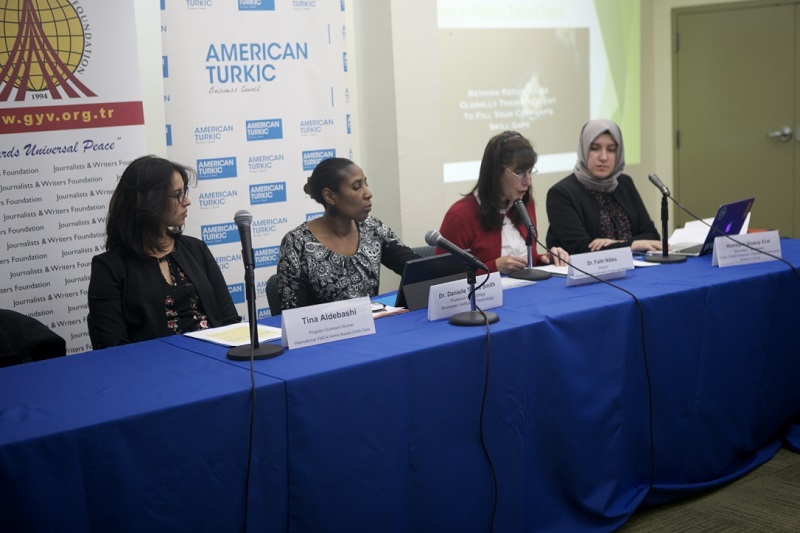
Humeyra Ulusoy-Erol has been interested in women's rights for a long time. In her home country, Turkey, she was the president of an organization devoted to empowering women as citizens. When she came to the U.S. to study chemical engineering as a Ph.D. student, she continued to advocate for women's rights. Her involvement with this issue has led Ulusoy-Erol all the way to the United Nations, where she and some friends organized a panel called "Empowering Refugee Women as Entrepreneurs in American Economy" for the 61st session of the UN Commission on the Status of Women.
Ulusoy-Erol, who chaired the panel, explained that she wanted to raise awareness of the contributions refugee women could make to their communities, given the right resources. "I wanted to let people know that refugee women can work here and make significant contributions here," she explained.
The panel was made up of three presenters who are experts in the subject of refugees. Danielle Taana Smith is a professor of sociology at Rochester Institute of Technology, and she studies the effects of global violence and the resulting displacements of people. Faith Nibbs is an assistant professor of anthropology at Southern Methodist University and directs the Forced Migration Upward Mobility Project. Tina Ahmed Aldebashi is an outreach worker for the Home Based Child Care Program at the International YMCA, and she is an artist who works with non-profit organizations to set up art fundraisers.
Ulusoy-Erol and the other panel organizers worked with The Dialogue Institute Southwest, Texas Turkish American Chamber of Commerce, Journalists and Writers Foundation, Women's Foundation of Arkansas, and Arkansas WAND to set up the panel. She explained that organizing the panel was a challenge that required a different set of skills from the research and engineering skills she practiced as a graduate student.
"Because I was the moderator, I had to organize everything and deal with technical issues," she explained. "I learned that you shouldn't get angry, you should find solutions and show leadership."
She went on to explain that the leadership and communication skills she acquired through this experience will also serve her as a scientist, and that she wants to spread the message that scientists can contribute to causes they care about. "We have a problem in science," she said. "We can talk to our peers, but we don't know how to talk to other people. We should advocate to teach people about science. We can show them that you can be a nerd and you can also work on philanthropy."
Ulusoy-Erol's drive to make the world a better place also affected her decision about what to study in graduate school. She is researching biofuels with Jamie Hestekin, professor of chemical engineering, and Christa Hestekin, associate professor of chemical engineering. The topic of alternative fuels is important to her because of the global impact it could have. "I have always thought that global warming is one of the biggest issues the world is facing right now. The biggest reason for that is fossil fuel combustion. To eliminate fossil fuels in the world, we must have an alternative solution," she explained.
When she finishes her doctorate, Ulusoy-Erol plans to continue making a difference through a career in academia, and she also intends to continue her work on women's and refugees' issues. "Women have lots of problems in this world, and we have to work on that."
Topics
Contacts
Camilla Shumaker, director of communications
College of Engineering
479-575-5697,